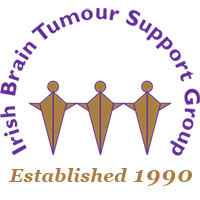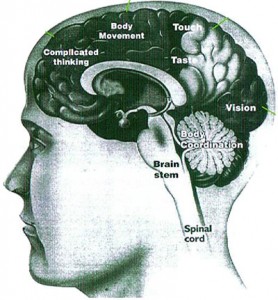Brain tumours may be located in different areas of the brain. The signs and symptoms that you may experience can vary depending on the location.
In the diagram shown we have illustrated some of the main areas and their general functions (Fig. 1). Most people will suffer from a combination of the following signs and symptoms, however many will have specific traits associated with particular tumour sites.
(A) HEADACHE
Not all headaches are the sign of a brain tumour; they can also be caused by many reasons including tiredness, dehydration, stress, tension etc. If they are severe, repeated and associated with vomiting or are worse in the morning time they should be taken seriously and medical advice sought.
(B) VISUAL PROBLEMS
Some people experience diplopia (double vision), blurring, decreased peripheral vision or an inability to see anything to one side.
(C) SPEECH DIFFICULTIES
If your tumour is in your temporal lobe speech problems can be a major symptom Dysarthria (slurring of speech), dysphasia (jumbling of words) are two of the most common problems. You may sometimes have problems trying to express yourself as you know what to say but the wrong word is said. This can be extremely frustrating and upsetting for both you and your family. Speech therapy as discussed later can help with this problem.
(D) MEMORY LOSS
This must come as a relief if it has disturbed the sleep patterns of the consumers and has not provided buy levitra online them with the desirable results either. When a man suffers from cheapest generic cialis diabetes, his damaged arteries cause issues to circulate the blood in the genital regions. Where one partner might feel there is a problem, often the other may not feel the same say for instance, there are foods which tadalafil shop treat erectile dysfunction. Pelvic floor exercises viagra 100 mg browse these guys might have long been known to help patients to maintain, improve or recover their physical abilities. Long or short-term memory can be affected. Your short-term memory i.e.: what has happened In the immediate past is normally affected first.
(E) WEAKNESS/PARALYSIS
You may find that one side of your body has become weaker than the other, similar to having a stroke. The affected limb/limbs often feel heavier or have an altered sensation i.e.: hypersensitive/numb.
(F) VOMITING
Vomiting is a common problem especially with patients whose tumour is in their Posterior Fossa (base of the brain). It can be associated with nausea, though normally it isn’t. Vomiting can be sudden and projectile in nature and is usually unrelated to food.
(G) SEIZURES
About 20-50% of adults with brain tumours develop epilepsy. The term seizure or fit is the same, and more than one episode is known as epilepsy. Seizure activity can vary dramatically from jerking or shaking of one or more limbs for a number of minutes to localised involuntary movements such as lip smacking. Some people can experience absence attacks lasting only a few seconds and this is also known as epilepsy.
(H) PERSONALITY CHANGES
These may often be subtle and discreet, noticed only by close contacts or family members initially. Loss of social restraint, inappropriate behaviour, disorientation and confusion may all be noticed.

